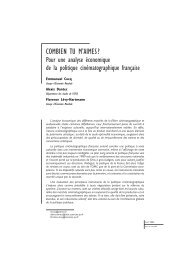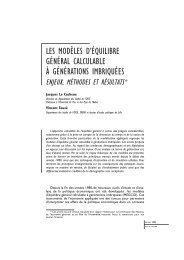N° 2005-09 Juin 2005 Guillaume Daudin* Jean-Luc Gaffard ...
N° 2005-09 Juin 2005 Guillaume Daudin* Jean-Luc Gaffard ...
N° 2005-09 Juin 2005 Guillaume Daudin* Jean-Luc Gaffard ...
You also want an ePaper? Increase the reach of your titles
YUMPU automatically turns print PDFs into web optimized ePapers that Google loves.
<strong>Guillaume</strong> Daudin and Sandrine Levasseurbetween the pre-1987 period and the post-1987 period. However, due to the acceleration ofimports from developing countries in 1987, the losses of industrial employment caused byimports are larger after 1987 than before 1987. Finally, he concludes that the decline ofindustrial employment in France is mainly due to internal factors, e.g. the low rate ofinvestment in France compared to the United States.Rowther and Ramaswamy (1999) explain 150,000 manufacturing job losses by tradewith developing countries. If Boulhol is right, these losses only numbered 30,000. This is thelowest estimation we have found so far. Without going into the precise examination of theeconometrics, it is possible that part of the decline in French investment is due to internationalrelocation outsourcing.ConclusionOne difficulty in drawing conclusions from this review is that few estimates are basedon recent data. Most of studies do not cover the ten last years. That makes drawing robustconclusions and extracting insights for future developments of the French labour marketsdifficult. Estimation of the job losses due to trade with developing countries vary between150,000 and 300,000, with an outlier at only 30,000. That represents only between 10 and20% of the total industrial job losses since thirty years (between 15 and 30% if one excludesdomestic outsourcing and temporary employment).However, trade with a group of countries cannot be taken in isolation: trade between thedeveloped and developing countries in general can have an impact on trade between Franceand other developed countries and should hence be taken into account. The review suggeststhat most French employment developments were not related to international trade as a whole— including international relocations and trade with developing countries — but haddomestic causes: low investment, skill-biased technological process and demand shifts.Hence, technical progress and internal factors explain the bulk of the decrease in industrialproduction and employment that frightens the public so much.This does not mean that trade cannot have a temporarily negative effect on employment,as happened in the late 1980s. It does not mean either than some categories do not sufferparticularly because of trade, as did unskilled workers. Nevertheless, if we assume that thecontribution of international trade to French employment developments over the 1980-95period is representative of effects of a growing openness to trade, the following prospectivefeatures emerge: first, even the temporary adverse effect in the future of deeper integration23








